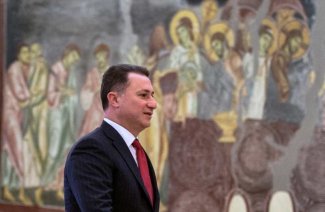Macedonia: End of the Gruevski government?

On 27 February Zoran Zaev, the leader of the opposition Social Democratic Union of Macedonia (SDSM), presented President Gjorgje Ivanov with the signatures of deputies who have declared their support for his government. In addition to members of the SDSM, the list also included representatives of three of the four main ethnic Albanian parties: the Democratic Union for Integration (DUI), the BESA movement, and the Coalition for Albanians (AzA). This marked the first step on the road to the opposition taking power in the country, which will mean the end of the rule (lasting more than a decade) of the centre-right VMRO-DPMNE under the former long-time Prime Minister Nikola Gruevski, In the early general elections held on 11 December 2016, Gruevski’s party won just 1 per cent more votes than the SDSM. In this situation, it became necessary to gain the support of at least some of the four ethnic Albanian groups that entered parliament in order to form a coalition government.
In the course of negotiations on creating a coalition government, three of the Albanian parties which had hitherto competed against each other joined forces, and at the beginning of January they agreed upon a list of demands with which they entered talks with the ethnic Macedonian parties, VMRO-DPMNE and the SDSM. These requests mainly concerned the improvement of the position of the Albanian community, which makes up more than 25% of the population in the Republic of Macedonia. DUI, BESA and AzA have called for the Albanian language to be raised to the status of second official language throughout Macedonia, as well as for equal funding for Macedonian and Albanian municipalities. They have also called for the creation of a ministry dealing with the rights of national minorities. The list formulated by the Albanian parties also includes recommendations for symbolic issues: changing the flag, emblem and anthem of the state, as well as coming to a settlement regarding the difficult history of Macedonian territory.
The agreement between the SDSM and the three ethnic Albanian parties was preceded by failed talks between VMRO-DPMNE and its previous partner, the DUI (the largest Albanian party in parliament). The smaller Albanian parties, BESA and AzA, had declared their willingness to cooperate with the SDSM since the beginning of the negotiations, which meant that the key to the shape of the future government lay in the talks between the DUI and the SDSM. The terms agreed by the Social Democrats and the three Albanian parties have not been made public; so far it has only been disclosed that the parties have reached a compromise on the issue of a new law regulating the status of minority languages, and the ethnic Albanian politicians have withdrawn their demands to change the national symbols. The parties have not so far established any bases for further cooperation; their discussions have considered both the creation of a four-party coalition and a minority cabinet with broad parliamentary support. In response to the prospect of losing power, VMRO-DPMNE initiated street protests, in which about 10,000 people took part. At the same time the President, who used to be a member of that party, is taking his time about nominating Zaev for the post of prime minister. Gruevski, however, is arguing that if the alliance of the SDSM and the Albanian parties comes to power, this will threaten the unitary nature of the state. He has suggested to the Social Democrats that he will support their minority government if they do not carry out the Albanians’ demands.
The early general elections in December were a consequence of the political crisis which had been ongoing since February 2015; this erupted after the opposition made public a series of recordings of illegal mass bugging of key people in the state by the Macedonian special services. This scandal, which confirmed the opposition’s suspicion that the Gruevski government had taken over the state’s institutions, eventually forced him to resign in January 2016 and call new elections (thanks to the involvement of the EU and the US).
Tensions between ethnic Macedonians and the Albanian minority are still one of the main problems in the Republic of Macedonia, despite the Ohrid agreement which ended the armed conflict of 2001. This agreement gave the Macedonian Albanians the extension of the right to use the Albanian language in government and education, proportional representation in government, the requirement of a double majority on issues important to minorities, and the decentralisation of the state. However, according to the Albanians, the implementation of the Ohrid arrangements has been continually sabotaged by the ruling VMRO-DPMNE party, thanks to which the ethnic Albanians’ rights have remained limited.
Commentary
- The situation on the Macedonian political scene is very dynamic, and it is by no means certain that Zaev’s party will come to power. The VMRO-DPMNE camp, which during more than ten years in government took control of almost the entire state apparatus, is afraid above all that the numerous corruption scandals will be settled as promised. For this reason, they have reached for a variety of tools to block the opposition’s takeover of power. The main element of pressure is the series of demonstrations by social movements associated with the Macedonian right-wing, among whom are many beneficiaries of Gruevski’s party’s long time in office.
- The support provided by the Albanian parties to the SDSM gives VMRO-DPMNE the opportunity to play on nationalist sentiments under the slogan of defending the unitary state. Gruevski argues that the alliance formed by the opposition has been inspired by the government of Albania, which is interfering in the internal affairs of the Republic of Macedonia. The leader of VMRO-DPMNE has thus drawn attention to the fact that the common negotiating platform of the ethnic Albanian groups was created a week after a meeting in Tirana between the leaders of three of the Macedonian Albanian parties with that country’s Prime and Foreign Ministers. Gruevski is also trying to mobilise his allies against the opposition forces, whom he accuses of destabilising the situation in the Republic of Macedonia ‘for Soros’s money’. Public sentiments will be further radicalised by the campaign for the municipal elections to be held in May.
- In order not to escalate the political crisis, the two main parties may seek to enter into an informal agreement in which the Social Democrats would agree to opt out of bringing criminal charges against Gruevski and his inner circle. This scenario assumes that a Zaev cabinet would enter into only limited cooperation with the special prosecution office set up in 2015, under pressure from the EU, in order to get to the bottom of the bugging affair. As a result, the court might find itself only investigating the bit-part players in the scandal.
- The general elections last December and the post-election negotiations have shown that as a result of the polarisation of the ethnic Macedonian community’s political views, the role of the Albanian electorate has increased. In this group of voters, the hitherto dominant DUI has come to be seen as part of a corrupt system of power, resulting in increased support for BESA and AzA. Disappointment at the DUI’s policies has also prompted ethnic Albanian voters to support the SDSM, which seeks to transcend the ethno-politic division of the Macedonian party scene. The significant decrease in support for the DUI has led to a change in the attitudes of the party’s younger generation of activists, who have refused to cooperate with Gruevski’s party, and agreed to devise a common negotiating platform for the Albanian parties. This was the cause of the failure of the talks with VMRO-DPMNE, as the three ethnic Albanian parties’ demands were unacceptable to Gruevski’s party.
- The potential escalation of the political crisis in Macedonia will require continued involvement by the EU and the US in maintaining stability in the country, as it plays an important role in maintaining control over the Western Balkan migration route. EU leaders are pressing the Macedonian political parties to ensure a peaceful change of government, and thus giving Gruevski to understand that he should come to terms with losing power. It is possible that this will induce VMRO-DPMNE to make an ostentatious anti-EU turnaround; this could open Gruevski’s camp up to the influence of the Kremlin, which is reluctant to see a Western presence in the Balkans.



